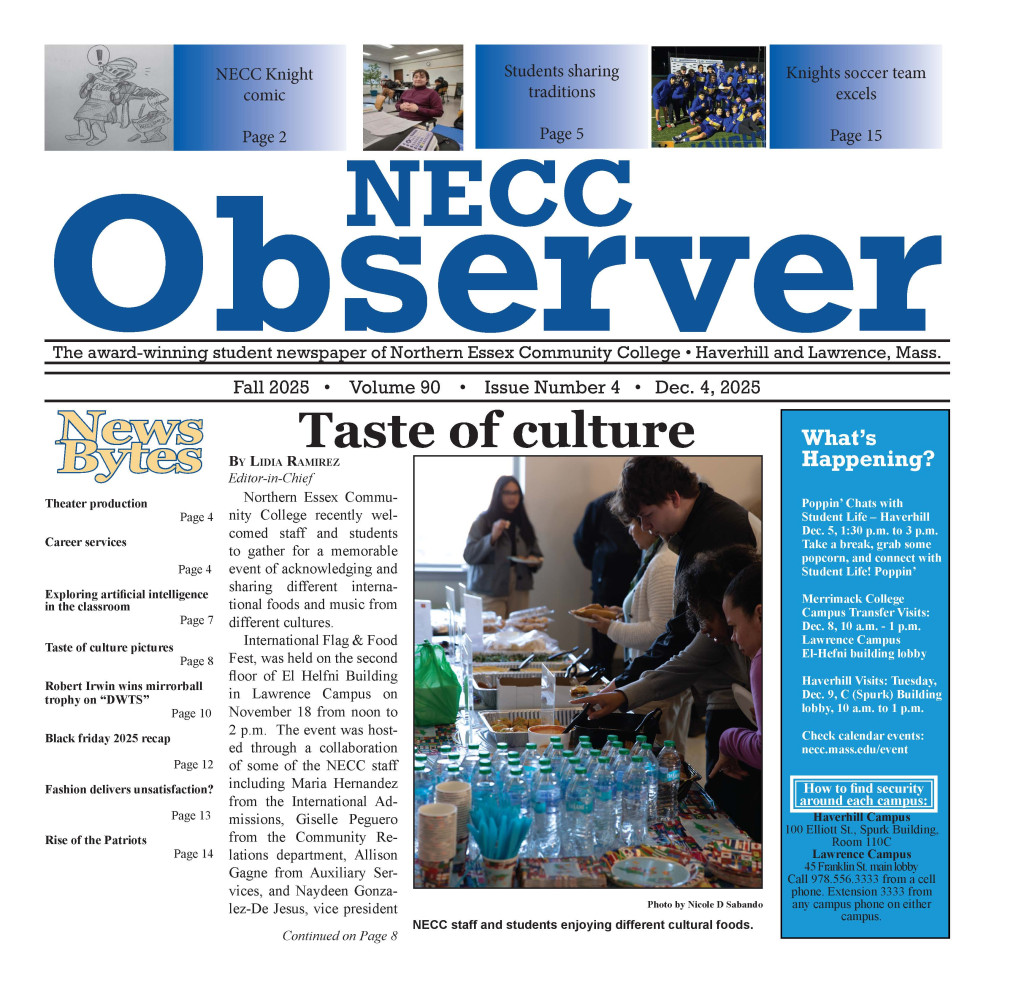At community colleges throughout the state of Massachusetts, 1,400 professors, librarians and other full time professional staff members are currently working without a contract.
“The contract expired at the end of June. We continued to meet with the state over July and August and into September with still no opening financial offer from the state,” said Joseph LeBlanc, “…at some point, the M-triple-C began to lose patience.”
LeBlanc is a professor at NECC. He was the faculty advisor for the Observer for 14 years and he is currently the president of the Massachusetts Community College Council (MCCC) which is the union that represents the 15 community colleges in Mass. A full time professor since 1988, LeBlanc said that he was unhappy with the policies toward higher education in the state under Governor William Weld and took action by joining the union.
“I pursued a pathway to become the president of the statewide union because I was not happy, but that was a long time ago. We were going through a lot of years with no raises,” he said.
After four years as the vice president and nearly ten years as the MCCC president, LeBlanc said that this year is the longest the negotiations have dragged on during his career with the union.
Contracts are negotiated every three years and although the adjunct (part-time) professors are also covered under a union contract, the contracts are not in sync, so theirs was negotiated about two years ago, without incident, under Governor Patrick’s administration. The adjunct professors are receiving a 4 percent raise in January.
LeBlanc said, “I don’t want to judge the incoming governor too harshly, but time will tell if he’ll be a friend to public higher ed and particularly a friend to community colleges. We’ll see, but as of right now, I’m not enjoying the experience of these contract talks at all. They’re dragging on for too long.”
LeBlanc went on to say that during times of economic crisis, the union has been patient and willing to accept that the state could not afford a larger increase in pay and that they have even gone long periods of time without a contract in the past. The terms of the previous contract continue to apply until a new agreement is reached. However, LeBlanc said, “During normal times, we expect to have a contract in place for a 3 year period… we’re not expecting to get a 10 percent pay increase but we’re at least expecting to have a fair deal.”
A fair deal would give the employees a 3.5 percent pay increase each year of the three year contract, according to LeBlanc, which would mimic the 2014 contract accepted by their counterparts in other higher education settings.
“The current financial offer from the state is 2 percent in yr one, 2.5 percent in year two and 2.5 percent in year three,” he said. “Everyone else in higher ed, UMass, the state universities and so forth, came to terms in 2014 at 3.5 percent, 3.5 percent, 3.5 percent. That was under a previous administration so this is a new group but we’re trying to push for the 3.5 percent.”
LeBlanc does not think that an increase in professor’s salary would translate to an increase in student fees, since they are voted on by the trustees based on the amount of state funding received that year and not so much on actual operating costs.
Since classes began in September, many NECC professors have been wearing buttons in an effort to raise awareness about the issues. In October, the protest became far more visible when a dozen or so faculty members began to hold informational pickets in front of the main entrance of the Haverhill campus encouraging people to beep and wave “to communicate to the president and his team that this needs to stop,” LeBlanc said. These pickets were informational only. Teachers are not allowed to go on strike, since they are public employees.
On the other side of the issue, The Massachusetts Board of Higher Education (MBHE) has a committee of ten members who are appointed by the college presidents. The board includes lawyers, provosts of academic affairs, human resource professionals and a spokesperson for the MBHE and includes NECC head of human resources.
NECC President Lane Glenn is the chair of the president’s council. He reports to the board on the current state of affairs and he comments on issues that come up related to the community colleges. Glenn is also one of three members that serve on the president’s labor relations committee, according to LeBlanc.
Glenn did not respond to Observer email prior to the printing of this article.
Fed up after months with no results, faculty overfilled conference rooms on both the Haverhill and Lawrence campuses on Monday, Oct. 26 and voted unanimously to implement “work to rule.”
This is when everyone agrees to do their job only to the letter of what the contract requires. “People frequently do a whole lot more than (what the contract requires). They may take on extra advisees, they might do all kinds of things that are in technical violation of the contract, but it’s because we’re here to help the students,” said LeBlanc.
He does not think that the students will be much affected by this development, since the professors are contractually required to hold office hours and to serve on one committee or club anyway.
“We were on work to rule a couple of times when I was the advisor of the paper and I continued to work with the students to help them put out the paper since that was part of my job … I could have cut back, but I chose not to,” LeBlanc said, since the number of hours that he put in far exceeded what was required of him. The only potential effect to students this year is that professors may limit their email responses to office hours and use an automated message to answer for them when they are not on the clock.
The potential also exists for some extra clubs or field trips to be suspended, if a professor is carrying more than what is required of them, but LeBlanc said that the administration is far more likely to feel the effects of this than the students.
“It will take us a few weeks to iron out the kinks of work to rule so that more and more people might become aware of it,” LeBlanc said. “People will still be teaching, they’ll be doing their job, they’ll be holding their office hours.” The difference, he explained, is that while they will still be serving on their college committee’s, their only input will be to move to adjourn them. If anyone seconds a motion to adjourn, it forces the committee to vote. If the committee votes to adjourn then the work of that particular committee will not get done.
Work to rule is now in effect at about half of the community colleges across the state and is expected to grow over the coming weeks to include nearly all of the them. “We’ve been trying to grind this out, we really have,” said LeBlanc, “but we just thought, it’s time to proceed down the road to do some picketing, to go on work to rule.”
LeBlanc said, “Nobody likes this, but from now on in, you’re going to have people going to (a meeting) and they’ll move to adjourn. So, technically, they’re there, but they want to cause the colleges and the state some pain here, some friction, cause some anxiety, you know. We want to move them closer to our position on things, so that we can negotiate a tentative agreement that will have a chance of passing.”
As far as the next step goes, faculty will continue to hold signs to inform everyone that this needs to stop. “If it continues in the spring, you’ll see increasingly public shows of our unhappiness about it, but I’m hoping this will be resolved before break.”
Political Science professor Stephen Slaner said, “I see the problem at NECC as a function of the state policy on higher education in general, and having a Republican governor isn’t all that helpful.”
Though, he deferred to LeBlanc for the specifics of the current negotiations.
LeBlanc said that teachers have gone years without a contract in the past “during really hostile administrations” and he pointed out that Governor Baker was on the staff of former Governor Weld during one such time. “I’m hoping that he (Gov Baker) values public higher ed and really values the community colleges and the role that we play. The smartest thing to do, I think, is to come to terms ASAP.”
This is just misc…
Email interview with political science professor, Stephen Slaner on Friday, Oct. 30:
I would defer to Joe LeBlanc on the current negotiations. In terms of your question, I don’t think students would see any impact of the “work to rule” policy – it has more to do with volunteering for committees or being available for special commitments. Fortunately, Gov. Baker doesn’t seem as fixated as Scott Walker in Wisconsin, where collective bargaining rights were severely restricted for public unions (except for fire and police, who tended to support Gov. Walker).
Why has there been a steep decline in union membership? (I think it’s especially serious in the private sector.) I would say it has to do with the indoctrination we’re all subjected to about how unions are “special interests” that are only out to advance their selfish, narrow interests. Noam Chomsky correctly takes the opposite position, that it’s unions that stand for the general interests of the working class, while corporations and most politicians stand for the special interests of the 1%, as the Occupy Movement put it. We tend to forget that unions brought us the eight-hour day, paid vacation, and some concern for occupational health and safety, among other things. As Bernie Sanders points out, our benefits are much less than those of workers in Scandinavia, and they would be still less were it not for unions. People should familiarize themselves with the great Bread and Roses strike of 1912 in Lawrence to see what impact a union can have. I don’t know that there are any real downsides to union membership. Indeed, if God forbid we are to have a President Rubio, the unions will be one force standing against his “help the rich and pass the ammunition” policy for the various wars he’ll get us into. (Needless to say, the unions would stand up against a President Clinton if she were to pursue similar policies.) I believe that food service workers and Wal-Mart employees have tried to organize, and there’s a video available on the situation at Wal-Mart. Naturally it’s an uphill battle, but the struggle is not yet over.
I’ve felt for some time that the TV series EYES ON THE PRIZE (the best series by far on the civil rights movement) should be complemented by a series called, say, ROLL THE UNION ON (to quote from a song about unions). There are plenty of workers and academics who could help make such a video; the problem is that PBS, with its corporate ties, probably wouldn’t air it.
I hope this answers your questions. Feel free to get back to me for any clarifications.
MCCC union information picket 8:30 – 9 a.m. Thurs. Oct. 22. At the main entrance of the Haverhilll campus.
Joe LeBlanc (MCCC_president@mac.com)
In attendance: (see pics)
Left to right: Professor Biff Ward; Professor Rick Lizotte; Professor and MCCC President, Joseph LeBlanc; Professor Pierre Leflynn; Academic Coordinator Joseph Scascitelli; Professor Deirdre Eudzyna; Professor Stephen Russell; Professor Suzanne VanWert; Professor Marilyn McCarthy; Professor Chris Rowse; Professor Tom Greene.


